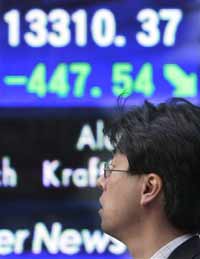European and Asian markets drop following Wall Street decline
Markets in Asia and Europe tumbled Monday against the background of Wall Street's decline on Friday after disappointing economic and corporate news rekindled worries about a U.S. recession.

Japan's benchmark Nikkei 225 index plunged 4.5 percent to close at 12,992.18. Markets in Hong Kong, South Korea, India and Australia also fell sharply, but shares in mainland China advanced.
The declines spread into early European trading, and U.S. stock index futures also were down, suggesting Wall Street was poised for another drop Monday.
Investors dumped stocks after a series of depressing economic and earnings reports Friday out of the United States - a vital export market and the world's largest economy - sent the Dow Jones industrial average falling 315.79, or 2.51 percent, to 12,266.39.
The bad news included poor quarterly results from American International Group Inc. and Dell Inc. and weaker-than-expected results on the Chicago purchasing managers index, which painted a dreary picture of the manufacturing sector.
"It's all due to fears of a recession in the U.S.," said CommSec chief equities economist Craig James in Sydney, Australia. "This is a global market sell-off."
The dollar's drop to a three-year low against the yen also weighed on sentiment in Tokyo as dollar weakness erodes overseas earnings at Japan's key exporters. The dollar fell as low as 102.59 yen before recovering some to 103.10 yen, down from 103.96 yen late Friday in New York.
Asian markets, which have fallen much of the year so far, had staged a modest recovery through the middle of last week, with Tokyo's Nikkei climbing to a seven-week high last Wednesday.
But pessimism returned Monday, sending Hong Kong's Hang Seng index down 3.1 percent to close at 23,584.97. India's benchmark Sensex tumbled 5.3 percent to a provisional close of 16,639.54.
In Europe too markets sank. The U.K.'s benchmark FTSE 100 fell 1.4 percent to 5,802.4, while Germany's DAX Index declined 1.5 percent to 6,644.31. France's CAC 40 slipped 1.4 percent to 4,723.
U.S. economic growth slowed to a 0.6 percent pace in the fourth quarter and some analysts believe the economy is already shrinking.
"The biggest economy in the world is mired in recession and everybody suffers," said Francis Lun, a general manager at Fulbright Securities in Hong Kong, summing up regional feelings.
Testifying before Congress last week, Federal Reserve Chairman Ben Bernanke signaled that the central bank sees weak growth as the main threat and is prepared to further cut interest rates.
Hours before Wall Street was to resume trading, Dow index futures were down 80 points, or 0.65 percent, to 12,204, while Standard & Poor's 500 futures were down 5.1 points, or 0.4 percent, to 1,326.2.
Global investors are bracing for two key U.S. economic reports due this week: Monday's release of the Institute for Supply Management manufacturing survey report and Friday's jobs numbers. On average, economists are forecasting a slight increase in non-farm payrolls, but many believe they will decline for a second straight month.
In other markets in the region, the Korea Composite Stock Price Index fell 2.3 percent to 1,671.73, while Australia's benchmark S&P/ASX200 index slid 3 percent to 5,405.8.
Markets in China, however, defied the trend. The benchmark Shanghai Composite Index rose 2.1 percent to close at 4,438.27, on expectations for possible market-boosting measures from the national legislative session, beginning this week.
Photo: portfolio.com
Subscribe to Pravda.Ru Telegram channel, Facebook, RSS!




